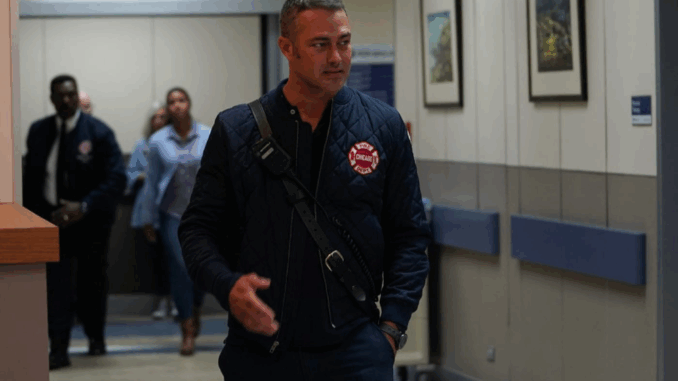
The First Words of a Legend: Taylor Kinney’s First Chicago Fire Line Happened Moments Before a Disaster
When a television series begins, the first words spoken by a main character often serve as a sign of what’s to come. They can establish a character’s personality, their motivations, or their relationship with the world around them. But in the case of Taylor Kinney as Lieutenant Kelly Severide on Chicago Fire, his first-ever line was a masterpiece of subtle foreshadowing, a playful jab at a friend that happened moments before a tragic fire that would change his life—and the show—forever.
It’s a powerful and poignant moment that even long-time fans might have forgotten, and it is a testament to the show’s brilliant writing and its commitment to a serialized, character-driven narrative from the very beginning.
A Scene of Jocularity and Camaraderie
The pilot episode of Chicago Fire, “Pilot,” introduces us to the men and women of Firehouse 51. The episode opens with the crew in a moment of jocularity, a group of friends and colleagues laughing and joking around before a big fire. In this scene, we are introduced to the rivalry between Truck 81 and Rescue Squad 3, and the friendly but competitive banter between their leaders, Lieutenant Matthew Casey and Lieutenant Severide.
Severide, with a devil-may-care grin on his face, delivers his first line, a lighthearted dig at his best friend, Andy Darden. “Andy makes Squad the day I no longer am in charge,” he teases, getting a chuckle from his fellow firefighters. The line is a simple one, but it immediately establishes Severide’s character. He is a charming, confident, and witty man who is at the top of his game. He is a leader who is respected by his peers, and he is a man who is not afraid to speak his mind.
But the line is also a tragic one. Moments after he says it, a call comes in for a house fire, and in the ensuing chaos, his best friend Andy Darden is killed. The fire is a catastrophic event that shakes the firehouse to its core, and it is a moment that fundamentally changes the relationships between the characters.
A Legacy of Guilt and Grief
Darden’s death is the inciting incident of the entire series. It is the event that creates the central conflict between Casey and Severide, a conflict that will define the first few seasons of the show. Severide, who feels a deep sense of guilt over his friend’s death, blames Casey for a mistake that was made in the heat of the moment. And Casey, who is equally tormented by the loss, blames Severide for a moment of poor judgment.
The death of Andy Darden is a powerful and emotional journey that is at the heart of the show’s narrative. It is a story about grief, about guilt, and about the weight of a legacy. The fact that Severide’s first line was a playful joke about his friend’s potential promotion makes the tragedy all the more powerful. It is a reminder that in the world of a first responder, life can change in an instant, and a moment of laughter can be followed by a moment of immense pain.
A Masterclass in Character Introduction
The first line of a character is more than just a line; it is a statement. It is a way for a show to tell the audience who this character is and what they are all about. In the case of Taylor Kinney’s Severide, his first line was a masterpiece of character introduction. It was a line that was both a statement of his character and a subtle foreshadowing of the events to come.
It showed us that Severide was a man who was confident in his abilities, a man who was a respected leader, and a man who was not afraid to speak his mind. But it also showed us that he was a man who was deeply connected to his friends and that he was a man who would be deeply affected by the loss of one of them.
The show’s creators, Derek Haas and Michael Brandt, knew exactly what they were doing. They knew that in order to make the audience care about the characters, they had to show them as real people, with real relationships and real emotions. They knew that in order to make the audience feel the weight of a tragedy, they had to show them what was lost. And they did this brilliantly, with a simple, funny line that would be followed by a moment of immense loss.
In the end, Taylor Kinney’s first line on Chicago Fire is a perfect example of the show’s brilliance. It is a line that is both a testament to the show’s ability to create a world of rich, believable characters and a subtle foreshadowing of the events that would define the series for years to come. It is a reminder that in the world of a first responder, a moment of laughter can be followed by a moment of pain, and a moment of triumph can be followed by a moment of tragedy. And it is a reminder that the show, even in its first episode, was a masterclass in the art of storytelling.